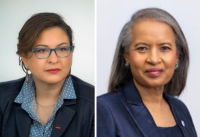
As the Summit of the Future unfolded in New York, the peoples of the Global South, particularly in the Middle East, were losing faith in international mechanisms and diplomacy. This event, held alongside the 79th session of the UN General Assembly, was intended to empower world leaders to make difficult decisions to promote peace, prosperity, and human rights.
With just six years left to meet the Sustainable Development Goals (SDGs), the Summit highlighted the urgent need for strengthened action from multilateral institutions. Launched during the UN’s 79th anniversary celebrations, it served as a reminder of how countries have drifted apart rather than have been cooperating against global threats.
The Pact for the Future, adopted by 193 States, includes a Global Digital Compact and a Declaration on Future Generations. The Global Digital Compact establishes a comprehensive framework for global governance of digital technology and artificial intelligence (AI) to prevent misuse and align it with the SDGs. In the Declaration on Future Generations governments commit to consider the interests of future generations in national and global decision-making.
The 2030 Agenda in peril
The 2030 Agenda is in crisis: only 17% of SDG targets are on track to be met by 2030, while progress on others, such as those related to poverty, inequalities, hunger, sustainable cities, aquatic and terrestrial life, and peace, is stagnating or even regressing. Alarmingly, many SDGs lack timely and reliable data. Progress is further hampered by ongoing multiple crises, while press freedom continues to decline. The commitment to leave no one behind is a dream deferred!
Is there hope?
In light of digital challenges and human rights issues, the President of the UN 79th General Assembly spoke of a better future. Yet, doubts remain about the ability of Member States to honour their commitments in a spirit of solidarity. Ongoing conflicts worldwide, including the dangerous situation in the Middle East, and the lack of peaceful resolutions pose a huge risk to multilateralism. The UN Secretary-General recognizes that global crises, rising inequalities, and massive debts force developing countries to spend more on debt repayment than on basic services, such as healthcare, asserting that action is required, not just dialogue.
How to act?
To fulfil commitments, three approaches are essential:
Dialogue and negotiation: There is a need to prioritize dialogue to end conflicts based on the principles of the UN Charter while reforming the Security Council, including the veto power. However, how can this be achieved when the UN Secretary-General faces backlash for calling for peaceful conflict resolution or when the integrity of the UN General Assembly is put into question?
Reforming the international financial system: Reforming institutions like the World Bank and IMF is necessary, as they are seen by many as being “outdated and unjust.” In this context, the UN Secretary-General also proposed new actionable mechanisms for debt relief, automatic issuance of special drawing rights in times of crisis, and suspending fossil fuel subsidies.
Utilizing technology: New technologies must serve humanity and be designed with human rights in mind. Recent simultaneous explosions of pagers, and other electronic devices in Lebanon, without knowledge as to who was in possession of them, their location and their surroundings at the time of the explosion, highlight the urgent need for effective governance and regulation of new technologies to prevent their misuse, disruption of supply chains and threats to global security.
How can we rekindle hope in a world beset by crises and embrace the promise of a brighter future?
To rejuvenate our crisis-ridden world, trust is paramount, attainable solely through the unwavering application of the rule of law. International humanitarian law, crafted to shield humanity from the most extreme consequences of conflict, including genocide, famine and disease, must be enforced consistently, whether in the Global South or the Global North. This calls for redesigning and “giving teeth” to mechanisms that uphold related rights, halting arms supply to conflict parties, and enforcing disarmament obligations for nuclear and biological weapons, alongside deterrence measures that impose the responsible use of technology.
Reforming the Security Council is more imperative than ever to ensure that it reflects the realities of our contemporary world and safeguards us against any State being deemed "more equal than others".
We must strengthen multilateralism, and we must safeguard multipolarity!
By Geraldine Fraser-Moleketi, Chair of the Committee of Experts on Public Administration and Lamia Moubayed Bissat, Vice-Chair of the Committee of Experts on Public Administration
 欢迎来到联合国,您的世界!
欢迎来到联合国,您的世界!